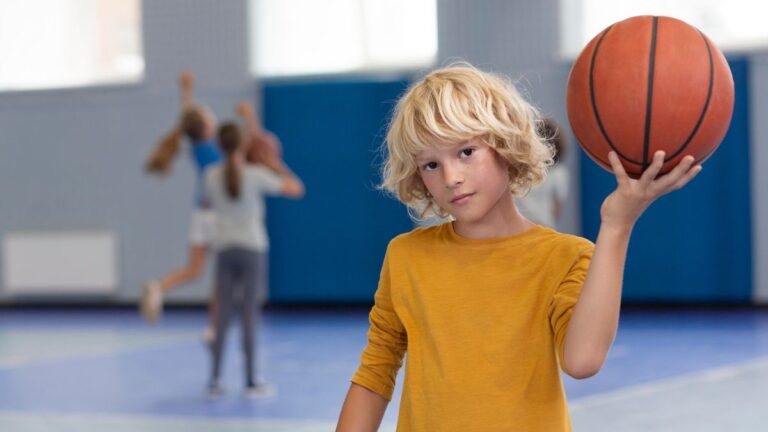Basketball is a lifelong passion for young athletes that goes beyond basic participation. It involves understanding, engagement, and skill-building. As children grow, their needs and learning styles evolve, making it crucial for parents, coaches, and mentors to provide a framework that extends beyond basic participation. Basketball is not just a sport but also a vehicle for building friendships, self-esteem, and discipline. In today’s busy environment, organized youth basketball training is valuable. Programs that effectively blend insightful technical drills with boundless creativity and continuous encouragement can truly ignite a deep-seated passion for the game. Additionally, these programs have the unique ability to impart valuable life lessons about the importance of hard work, the significance of teamwork, and the undeniable strength of resilience that are essential not only in sports but also in various aspects of life.
Laying the Groundwork: Key Basketball Fundamentals
Mastering foundational basketball skills, including dribbling, passing, shooting, and defense, is essential for a great player’s journey. Repetition of these skills in age-appropriate drills leads to higher retention and better performance. The Youth Basketball Coaching Association suggests that players who receive early, detailed instruction on the basics have a lower dropout rate and are more likely to enjoy sports in the long term. Building session plans that alternate between focused fundamentals and energetic scrimmages helps maintain high engagement and helps kids develop muscle memory for future growth. Integrating these skills with creativity, such as obstacle courses, target games, or teamwork exercises, is essential.
Positive Coaching Strategies
Coaching young players involves guiding mindsets and refining skills. Children are sensitive to tone, energy, and feedback, so coaches and parents can turn mistakes into learning moments by focusing on encouragement and actionable steps. Highlighting small progress builds pride and motivates ongoing effort. Parents can also support children by reinforcing effort, valuing persistence, and detaching self-worth from wins or losses. After each practice or game, families can discuss what felt challenging and rewarding, helping kids reflect on struggles as stepping stones. Successful coaching and parental involvement go hand in hand, emphasizing growth, camaraderie, and a love for learning on and off the court.
Structuring Drills for Progressive Challenges
Basketball education should be progressive and scalable, gradually layering complexity as young athletes mature. It involves moving from simple movements to dynamic scenarios, such as passing drills and simulated game situations. Coaches can tailor practices by introducing age-appropriate rules, lowering the basket height for younger ages, and focusing on skill variety rather than competitiveness. It helps athletes participate confidently, reduces the risk of injury, and encourages overall development. Age-appropriate progressions include focusing on body awareness, balance, and introductory ball handling for children aged 6-9, as well as linking multiple skills and integrating competition, strength training, and tactical play for children aged 14 and above.
Building Resilience Through Teamwork and Adversity
Basketball teaches mental and emotional attributes like resilience, cooperation, and composure under pressure. Open communication, a clear understanding of roles, and support for teammates are essential for collective success. Coaches can foster these attributes by promoting honest feedback, setting mutually agreed-upon goals, and sharing responsibility for both victories and losses. When adversity strikes, supportive coaches reframe setbacks as lessons, encouraging kids to keep striving and fostering a climate where taking risks and making mistakes are part of growth. These strategies cultivate emotional intelligence and help children navigate life’s more significant challenges.
Personalized Feedback for Lasting Growth
Individual attention is crucial for achieving competence and excellence in sports. Group drills are essential, but individualized feedback can turn abstract concepts into actionable improvements. Coaches can utilize one-on-one instruction, skill assessments, or video reviews to tailor their approach to each player’s individual learning needs. This approach helps kids feel invested in their progress, especially for newer players and those who excel. Personalized praise, such as cheering for tough rebounds or smart defensive switches, reinforces self-belief and encourages acceptance of growth and setbacks as natural parts of their athletic journey.
Parental Involvement and Healthy Routines
Parental support is crucial for a child’s healthy development on the court. Modeling healthy habits at home, such as regular sleep, consistent meals, and an open mind to new experiences, is essential. Encouraging casual activities and discussions about practice can demonstrate genuine interest in the subject. Prioritizing recovery, guiding children to choose nutritious snacks and hydrate, and minimizing digital distractions during critical learning windows can foster a supportive culture and help children associate sports with encouragement, not pressure.
Staying Motivated: Celebrating Small Wins
Motivation is crucial in youth sports, and celebrating incremental victories can inspire continued participation and joy. Coaches and parents should highlight these wins through shout-outs, small awards, or team-based celebrations. Introducing fresh drills, fun scrimmages, and non-traditional practice formats can keep young athletes curious and prevent monotony. Inviting local student-athletes or alums to share their journeys can inspire and offer a concrete example of sustained dedication. Regular encouragement and engagement can help maintain a sense of forward momentum in basketball.
Looking Forward
Basketball’s blue goes far beyond the scoreboard. Players who are taught fundamentals, exposed to positive coaching, supported at home, and motivated through adaptability emerge not only as skilled competitors but also as confident and resilient individuals. The discipline, creativity, and camaraderie formed on the court shape youth for years to come. By focusing on long-term growth rather than instant results, coaches and communities ensure that every child, regardless of their future in the sport, benefits from picking up the ball and giving their best.

